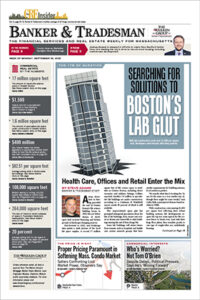
Tech firms’ growth in Boston has turned into a problem for office landlords thanks to their comfort with work-from-home policies.
Cities across the country have seen their office markets tank in the wake of the coronavirus pandemic.
But new stats show that Boston has been particularly hard–hit, and slower to rebound than other major metropolises like Washington, New York, Seattle, and Los Angeles.
Demand for office space has plunged nearly 62 percent in Boston since February, according to the newly minted VTS Office Demand Index (VODI), put out by the commercial real estate software company of the same name and based on leasing activity on the company’s widely-used platform.
That’s slightly better than where demand was in the spring, when it had fallen by an even steeper 71 percent, but not by all that much.
And that puts Boston near the bottom of the VODI, with a score of 36, where 100 has been the national, pre-pandemic baseline over the past two years.
Tech Fueled Office Boom
What explains Boston’s low score?
Well one key factor appears to be the growing dominance of the tech sector in the city’s office market.
While tech companies hungry for office space helped fuel a roaring commercial real estate market over the past few years, that same reliance on tech as growth driver has come back to bite the Boston market in the wake of the coronavirus pandemic.
Apple, Microsoft, Google and Amazon have become major players in the Boston and Cambridge office markets, while Twitter, Spotify, Carbonite and a mix of startups and more substantial players have also flooded into the old Financial District in downtown Boston.
Just before COVID-19 hit, Boston ranked No. 4 in the country for its share of the top 100 office leases by tech companies in 2019, for a total of 1.2 million square feet, according to commercial real estate firm CBRE.
Boston is also one of a handful of cities that have been reaping the lion’s share of job growth in the tech sector, with a Brookings Institution study finding 90 percent of all new job growth in the industry between 2005 and 2017 happening in Boston and four other metros.
Comfort with Remote Work
But what seemed to be an unalloyed boon for the commercial real estate market in the Boston area now seems more like a mixed blessing in the wake of the coronavirus pandemic.
It’s not that Big Tech’s bottom line has come under stress, far from it. Tech moguls like Jeff Bezos and Mark Zuckerberg are making money hand over fist amid increased demand for their various services in our new, socially-distanced world.
Rather, it’s a case of tech companies having adapted almost too well to the conditions of our dystopian, pandemic–shadowed reality, with these companies having signaled early on in the pandemic that work-from-home will be their new norm until the coronavirus is finally brought to heel.
It is that shift to remote work by the tech sector, in turn, that has played a significant role in dampening demand for new office space in Boston, according to Eli Gilbert, head of market research at VTS.
“When it comes to Boston, one of the big contributors to that slowdown has been the tech sector,” Gilbert said. “Certainly, of any industry out there that is an office space user, tech companies are the ones the most comfortable with the work-from-home place [where] we are today.”
Give and Take
It’s far from a perfect theory. Seattle, home to Amazon and Microsoft, has a VODI office demand score of 42, still on the low side but higher than Boston’s 36.
Chicago, not exactly a tech hub, is now sucking wind when it comes to demand for office, with a positively anemic score of 28.
But other markets more reliant on industries other than tech have indeed seen demand for office space bounce back more quickly than we have.
With Wall Street booming, New York saw one of the sharpest rebounds in office demand following the coronavirus shutdown last spring, with its VODI score back up to 42.
And with government spending way up amid the pandemic, Washington, D.C. is weighing in at a vastly improved 67 on the VODI scale.

Scott Van Voorhis
Riding a surging creative sector amid a boom in streaming services, Los Angeles, with a score of 72, has fared the best, with office demand now back to three-quarters of where it was before the pandemic.
Yet other than San Francisco, no other city has seen such a sluggish rebound in office demand: Boston’s VODI score rose a measly 9 points after hitting bottom at 27 this spring.
Apparently, what the tech sector giveth, it can also taketh away.
Scott Van Voorhis is Banker & Tradesman’s columnist; opinions expressed are his own. He may be reached at sbvanvoorhis@hotmail.com.




